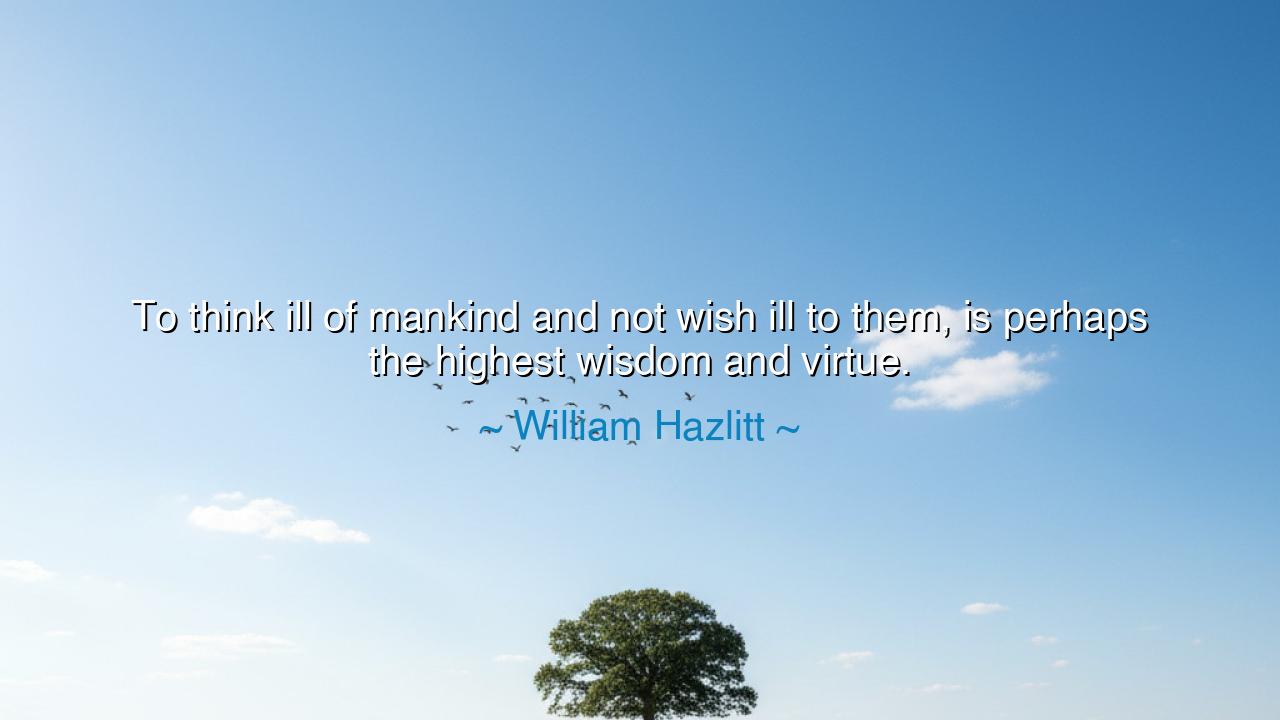
To think ill of mankind and not wish ill to them, is perhaps the
To think ill of mankind and not wish ill to them, is perhaps the highest wisdom and virtue.






Hearken, O children of the ages, to the penetrating words of William Hazlitt, who speaks of the subtle triumph of the soul over its baser inclinations. He teaches that to think ill of mankind—to recognize the flaws, errors, and follies of human nature—yet to wish ill upon none, is perhaps the highest attainment of both wisdom and virtue. This is the mastery of judgment tempered by compassion, a grace that elevates the spirit above resentment and vengeance.
Hazlitt reminds us that the world is fraught with deceit, greed, and cruelty, yet the truly wise perceive these truths without succumbing to hatred. To discern human frailty is necessary for understanding, but to temper judgment with mercy and goodwill is the mark of the virtuous. Wisdom lies not in blindness to imperfection, but in the refusal to perpetuate harm in response, choosing instead to cultivate restraint, insight, and benevolence.
Consider the life of Abraham Lincoln, who witnessed the divisions, treacheries, and hatreds of a nation torn by civil war. He recognized the flaws in men, yet strove to reconcile, to pardon, and to govern with justice tempered by mercy. In doing so, he embodied Hazlitt’s teaching: though aware of human failings, he wished no ill, seeking instead to unite, heal, and elevate the hearts of those he led. This delicate balance of discernment and compassion is the pinnacle of human virtue.
Even in daily life, the principle holds true. The scholar who critiques with fairness, the elder who corrects without malice, and the friend who warns without bitterness all exercise the highest form of moral intelligence. To think ill without wishing ill cultivates inner strength, preserves peace of mind, and transforms judgment into a source of guidance rather than vengeance.
O children of the future, carry this teaching in your hearts: recognize the faults of men, but let your spirit remain free of ill will. In every action, thought, and judgment, temper insight with compassion, and allow wisdom and virtue to guide your dealings with others. In this delicate equilibrium lies the power to live nobly, to influence without harm, and to rise above the pettiness that ensnares the unrefined soul.
If you desire, I can also craft a visual, ancient scroll-style presentation of this passage to capture the heroic, timeless, and deeply reflective essence of Hazlitt’s teaching on human judgment, mercy, and the highest virtues of the soul.






MDMai Duyen
I’m fascinated by the ethical implications of this statement. It seems to suggest that virtue is not about blind optimism but about deliberate moral discipline. Could this approach serve as a framework for conflict resolution or leadership, where one acknowledges potential wrongdoing without responding with vengeance? I’d like to explore whether this principle can be applied universally across cultures, or if it depends heavily on societal norms and personal temperament.
T1Nguyen Thi Thanh 1989
From a psychological standpoint, I’m curious about the impact of this mindset on mental health. Does recognizing human shortcomings while resisting negative impulses promote resilience, or could it lead to internalized frustration over time? How might one balance this dual awareness of human fallibility with self-compassion and realistic expectations of others? I wonder if modern cognitive behavioral approaches align with Hazlitt’s suggestion in encouraging thoughtful restraint rather than reactive judgment.
NBNguyen Nguyen Ba
I feel a tension in this idea between realism and moral aspiration. On one hand, acknowledging human flaws seems intellectually honest; on the other, refraining from wishing harm is a high ethical standard. How do we cultivate such self-restraint in practice, especially when faced with betrayal or cruelty? Are there historical or philosophical examples of individuals who consistently applied this principle successfully, and what can we learn from their experiences?
DHThan Dac Hung
This perspective raises a profound moral question for me: can wisdom and virtue exist independently of optimism? If one constantly suspects ill intentions in others, does that diminish the value of their kindness when it does appear? I’m curious whether this viewpoint encourages a more realistic understanding of human nature or whether it inadvertently justifies a cold, judgmental outlook that masks deeper ethical reflection.
ATPhat An Thinh
I find this idea intriguing, yet it makes me wonder how practical it is in everyday life. Is it truly possible to hold a skeptical or critical view of humanity while consistently acting with kindness and restraint? Often, our judgments of others provoke strong emotional reactions. Could this approach of separating thought from action help us navigate social conflicts more peacefully, or does it risk fostering a kind of detached cynicism instead of genuine compassion?